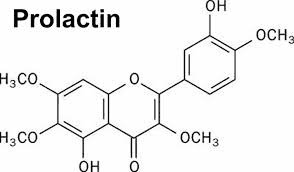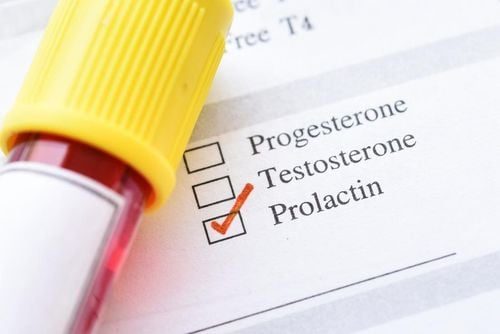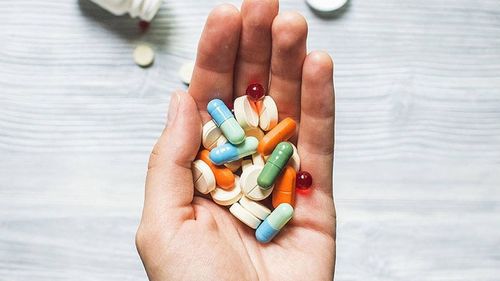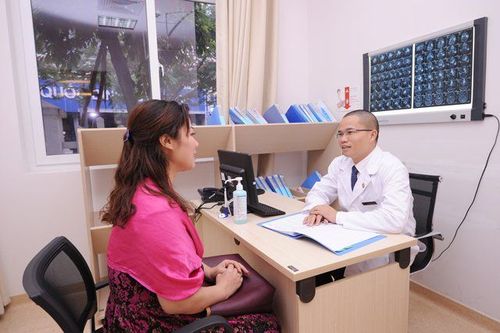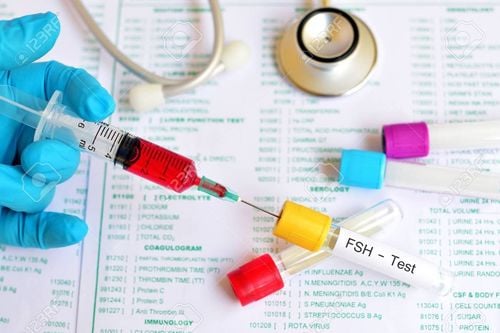This is an automatically translated article.
Hyperprolactinemia is a condition characterized by high levels of the hormone prolactin in the blood. There are many different causes of this phenomenon, one of the most common causes is a disorder of the hypothalamic-pituitary axis.1. Hyperprolactinemia?
Prolactin is a hormone produced by the pituitary gland. It helps to stimulate and maintain breast milk production. Hyperprolactinemia describes an excess of this hormone in the body. Hyperprolactinemia is a common endocrine disorder caused by disorders of the hypothalamic-pituitary axis. It can also affect men, but is more common in women.
2. Causes of hyperprolactinemia
There are 3 main groups of causes of hyperprolactinemia, including:
2.1 Pathological causes Pituitary tumors have 2 types of microadenoma (less than 10mm) and macroadenoma (larger than 10mm). Among pituitary adenomas, prolactin-secreting tumors are the most common, accounting for more than 30% of hyperprolactinemia cases. Pituitary tumors can compress, prevent dopamine from descending from the hypothalamus, lack of "blocking" effect of hyperprolactinemic dopamine occurs. In contrast, 25% of GH-secreting pituitary adenomas may increase prolactin secretion. Hypothyroidism (low thyroid hormone levels). Macroprolactinemia, which is the polymer form of many prolactin molecules. These polymers normally bind to IgG and are incapable of binding to prolactin receptors, but also have little effect on prolactin. Autoimmune condition of the pituitary, which causes lymphocytosis, can also cause hyperprolactinemia. Typical of this form is lymphocytic hypophysitis in women of childbearing age. Cirrhosis. Hypothalamus: The hypothalamus functions as the link between the nervous system and the pituitary gland. Elevated prolactin levels can often be directly related to a tumor, injury, or infection of the hypothalamus. Spinal cord injuries. Chronic kidney failure. 2.2 Physiological causes Pregnancy: Serum prolactin increases throughout pregnancy, reaching a peak at birth. A possible cause of hyperprolactinemia is increased serum estradiol levels during pregnancy. About six weeks after birth, estradiol secretion has decreased and basal serum prolactin levels are usually normal, even when the mother is breastfeeding. Lactation: Nipple stimulation during breastfeeding increases blood levels of prolactin, presumably through a neural pathway. During the first weeks postpartum, blood prolactin levels can rise up to 300 ng/mL above normal in response to breastfeeding. Nipple stimulation, breast massage, breast surgery, wearing bras that are too tight.

Kích thích núm vú, xoa nắn vùng ngực, phẫu thuật ngực vú, mặc áo ngực chật quá
Exercise, sleep too much. Stress Trauma, surgery. 2.3 Pharmacological causes Some groups of drugs have side effects that cause hyperprolactinemia such as:
Depression drugs: Desipramine, clomipramine Psychiatric drugs Antihypertensives: Verapamil H2 blockers such as cimetidine, ranitidine Antiemetics such as metoclopramide Estrogen . In summary, high blood prolactin levels are considered completely normal during pregnancy and lactation, however elevated prolactin can occur at other times due to medical reasons and drug use. One of the more common causes is the formation of a benign tumor on the pituitary gland. Elevated prolactin can affect both women and men, leading to sexual problems if left untreated. timely.
Vinmec International General Hospital is one of the hospitals that not only ensures professional quality with a team of leading medical doctors, modern equipment and technology, but also stands out for its examination and consultation services. comprehensive and professional medical consultation and treatment; civilized, polite, safe and sterile medical examination and treatment space. Customers when choosing to perform tests here can be completely assured of the accuracy of test results.
Customers can directly go to Vinmec Health system nationwide to visit or contact the hotline here for support.
SEE ALSO :
The relationship between the hormone Prolactin and breast milk secretion How is breast milk "produced"? Did you know: Breast milk also has many types according to each stage




